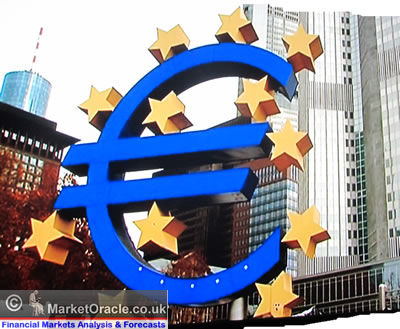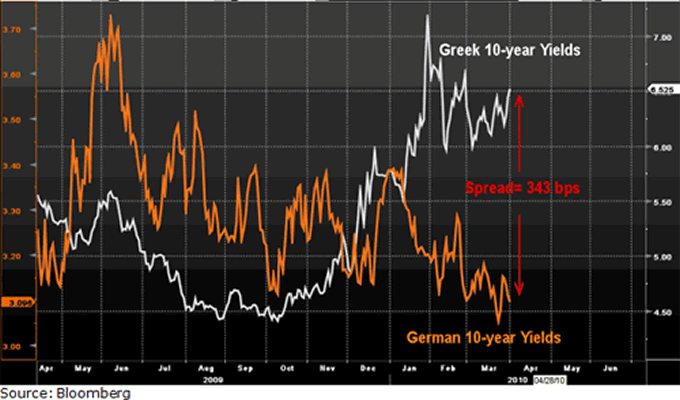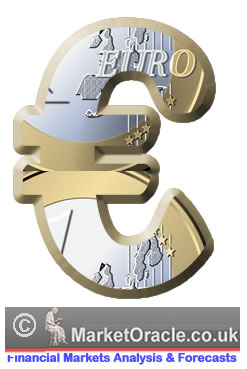Greece Debt Crisis Bailout, Europe Out of Time-Outs
Economics / Euro-Zone Apr 05, 2010 - 09:01 AM GMTBy: Bryan_Rich
 In sports, if the opposition is on a roll and the momentum is squarely against you … you need a “time-out.” This interruption in action can break the rhythm of the opposing team and give your team a moment to re-evaluate and re-group.
In sports, if the opposition is on a roll and the momentum is squarely against you … you need a “time-out.” This interruption in action can break the rhythm of the opposing team and give your team a moment to re-evaluate and re-group.
In the euro zone, European officials called a time-out back in February hoping to stem the heavy wave of selling against the euro and the speculative pressures on sovereign debt risk.
And when they re-grouped they brought out a carefully managed game-of-confusion.
Here’s how it worked …
- They announced support for Greece; but they didn’t provide any details,
- They leaked rumors of a financial aid package; then denied any notion of transferring taxpayer money from a fiscally responsible country to a fiscally irresponsible country, and
- They talked about creating a European Monetary Fund to support ailing countries in the monetary union; then denied the viability of such an idea.
In short, they gave enough cross signals to confuse market speculators, to break their rhythm and confidence. As such, the euro stabilized, and the bets against Greek debt subsided a bit.
 |
| Euro-zone leaders created enough confusion to buy some time for their common currency. |
Yet, based on the structural flaws of the monetary union, the likelihood of actual intervention resolving the problems — in Greece, the other weak spots in Europe, and the resulting damage done to the euro — was nil.
Out of Time-Outs
It’s now apparent that Europe has exhausted its allotted “time-outs.” And we have some semblance of resolution on the “they will or they won’t bail-out” subject. European leaders have finally agreed to act with the IMF as a lender of last resort to Greece.
Although Europe now professes support for this plan, prior comments on record are to the contrary. Here’s what the three big hitters in Europe had to say prior to this agreement …
- French President Nicolas Sarkozy has said an IMF option would make the E.U. look incapable of resolving its own crises,
- European Central Bank President Jean-Claude Trichet previously said IMF involvement would “not be appropriate,” and
- German Chancellor Angela Merkel said, “We want to solve our problems ourselves.”
So now it’s up to the markets to determine whether or not the IMF/EU safety net works. Is it enough to reduce the risk premium associated with investing in Greek debt?
The early indication: Apparently not. Take a look at this chart …

The spread between German bond yields (the orange line) and Greek bond yields (the white line) has worsened since the announcement of Europe’s rescue plan. With the Greek bond sale this week, the cost of borrowing for Greece is a key barometer for gauging the confidence (or lack thereof) that the EU/IMF plan has attempted to manipulate. And it didn’t go well.
The EU/IMF Rescue Plan Smell Test
There are some very fundamental problems that don’t get this “rescue plan” past the smell test. Here are three of them:
- How do mandates imposed by taking IMF funds marry with monetary union principles?
- The dam has broken, and other weak countries will be lining up for a similar backstop. How can they be denied?
- Direct or indirect bail-out of a euro member is a breach of the monetary union’s guiding principles. How can confidence be restored in a concept that has proven to be flawed?
For some insight, see what Dominique Strauss-Kahn, head of the IMF, had to say about Europe’s future this week:
“The risk for European economies is to be in the second league and not in the first, with the United States and Asia.”
Europe’s Exit Strategy … on Hold?
 |
| The risk of a double-dip recession is bound to put downward pressure on the euro. |
The markets are also starting to recognize the monetary policy impact that the struggling euro-zone constituents will have on the ECB’s ability to reverse ultra-easy money conditions. With aggressive austerity plans facing Greece, Spain, Portugal and Ireland, a risk of a double-dip recession for the euro zone rises dramatically.
With these euro economies under the gun to rein in deficits now in order to bring deficits back toward treaty limits set forth by monetary union guidelines, the outlook is grim.
Greece’s GDP contracted by 2 percent in 2009, while running a 12.7 percent deficit. Now under its austerity plan it’s attempting to cut the deficit (relative to GDP) by 4 percentage points this year … while growth is expected to contract again in the neighborhood of 1.7 percent.
Indeed, the possibility of that plan succeeding seems highly unlikely.
This creates a policy divergence between the U.S. and all three of its leading, developed market competitors … the UK, the euro zone and Japan. So with interest rate prospects widening in favor of the U.S., and the continued uncertain outcome in the euro zone, look for the euro to continue its decline.
Regards,
Bryan
This investment news is brought to you by Money and Markets. Money and Markets is a free daily investment newsletter from Martin D. Weiss and Weiss Research analysts offering the latest investing news and financial insights for the stock market, including tips and advice on investing in gold, energy and oil. Dr. Weiss is a leader in the fields of investing, interest rates, financial safety and economic forecasting. To view archives or subscribe, visit http://www.moneyandmarkets.com.
© 2005-2022 http://www.MarketOracle.co.uk - The Market Oracle is a FREE Daily Financial Markets Analysis & Forecasting online publication.



